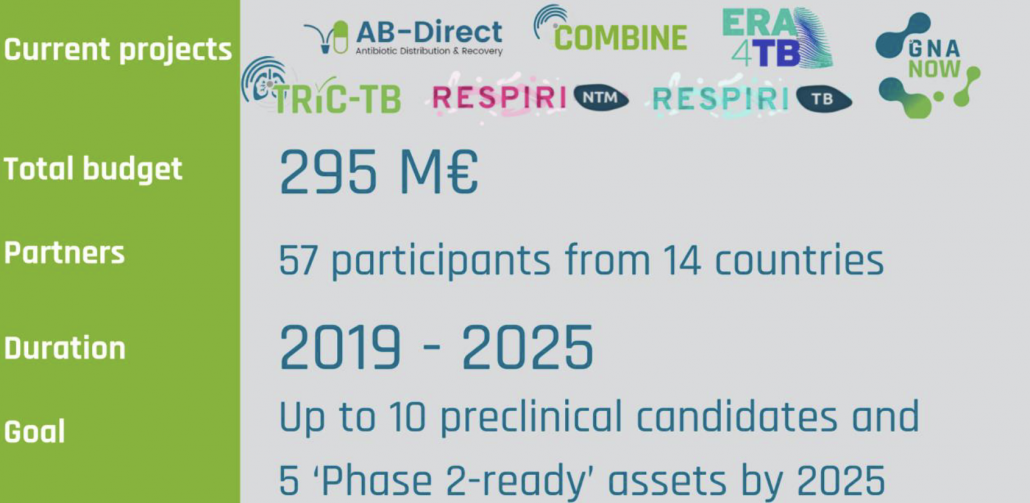The AMR Accelerator: A New Public-Private Collaboration to Tackle Antibiotic Resistance Together
The AMR Accelerator Programme connects seven projects launched by the Innovative Medicines Initiative (IMI) during 2019 and 2020. With more than 50 partners and 295 million Euro of dedicated funding, the Programme is united by a common goal to develop new tools and therapeutics to fight resistant pathogens. A wide-ranging series of antibacterial programmes will advance the pipeline of antibiotics targeting Mycobacterium tuberculosis, nontuberculous mycobacteria and Gram-negative bacteria. 2021 will be an exciting year with the start of several First-In-Human studies, as well as the potential addition of two new Accelerator projects.
The AMR Accelerator currently has seven projects: AB-Direct, COMBINE, ERA4TB, GNA NOW, RespiriNTM, RespiriTB, and TRIC-TB. These public-private partnerships are funded by IMI with matched in-kind contribution from EFPIA companies, and complement and build on the capabilities of the IMI New Drugs for Bad Bugs (ND4BB) Programme. The AMR Accelerator will address many of the scientific challenges of AMR.

The AMR Accelerator Programme is composed of three Pillars:
- The Capability Building Network (COMBINE project) provides coordination and support across the Accelerator, in addition to its scientific goals to improve and standardise animal models used in AMR research, and optimise the design of clinical trials.
- The Tuberculosis Drug Development Network, encompassing the ERA4TB project, is working to accelerate the development of new treatment regimens for tuberculosis.
- The Portfolio Building Networks, integrating RespiriTB, RespiriNTM, TRIC–TB, GNA NOW, and AB–Direct projects, are set up to support collaborative efforts to discover and advance new antibacterial assets.
The recently published AMR Accelerator portfolio pipeline provides an overview of the 13
antibacterial programmes and where they stand in terms of novelty and development stage. If successful, projects in the Accelerator are expected to deliver up to ten new preclinical
candidates and five ‘Phase 2–ready’ assets by 2025.
Ander Karlén, Professor at Uppsala University and COMBINE Coordinator: “It is very exciting to see this large number of partners combining resources and experience to deliver these very important goals”.
Concrete activities of the AMR Accelerator since start include:
- A virtual Cross–Pillar meeting, bringing together representatives from all projects to exchange information, explore synergies, and discuss challenges.
- A series of COMBINE webinars and the launch of an open call for preclinical and clinical data sets from the study of prevention or treatment of bacterial infections.
- Under the Respiri projects, nine research teams and Janssen Pharmaceutica have come together to search for new weapons in the fight against mycobacterial tuberculosis and non–tuberculous mycobacteria.
- Swiss pharmaceutical company, BioVersys, and GlaxoSmithKline (GSK) are co–leading the TRIC–TB project which kickstarted the development of a novel compound aimed at overcoming the resistance against ethionamide and prothionamide for the treatment of tuberculosis. The candidate has recently entered into Phase 1.
- In the two–year long AB–Direct project, GSK, together with project partners, initiated work on a programme investigating tissue distribution of gepotidacin, which will be investigating in a clinical Phase 1 study, sponsored by Inserm, to start early in 2021. Gepotidacin is currently in Phase 3 development by GSK as a potential treatment for uncomplicated urinary tract infection and uncomplicated gonorrhea.
- In the TB–dedicated network, the European Regimen Accelerator for Tuberculosis (ERA4TB) has already endorsed ten specific Asset Progression Plans for six different compounds which are in progress, two already in Phase 1 studies.
- In addition, the Gram–Negative Antibacterials NOW (GNA NOW) consortium successfully managed to keep on track its three programmes owned by the biotech companies Evotec and Nosopharm in spite of the drug development challenges posed by the COVID–19 pandemic.
Pierre Meulien, IMI Executive Director: “The AMR Accelerator shows how collaboration and solidarity allow researchers to contribute to the elimination of antibiotic–resistant tuberculosis and AMR. This is particularly important now, in the midst of the COVID–19 pandemic, as AMR research is essential to reducing the burden of secondary bacterial infections in the future.”
